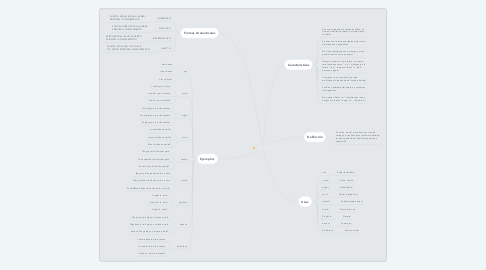
1. Formas Gramaticales
1.1. AFIRMATIVO
1.1.1. SUJETO+VERBO MODAL+VERBO PRINCIPAL+COMPLEMENTO
1.2. NEGATIVO
1.2.1. SUJETO+VERBO MODAL+VERBO PRINCIPAL+COMPLEMENTO
1.3. INTERROGATIVO
1.3.1. VERBO MODAL+SUJETO+VERBO PRINCIPAL+COMPLEMENTO?
1.4. HAVE TO
1.4.1. SUJETO+DO/DOES+NOT+HAVE TO+VERBO PRINCIPAL+COMPLEMENTO
2. Ejemplos
2.1. can
2.1.1. I can dance
2.1.2. I can`t dance
2.1.3. Can I dance?
2.2. could
2.2.1. I could go to Frace
2.2.2. I couldn`t go to France
2.2.3. Could I go to France?
2.3. might
2.3.1. You might be in the teacher
2.3.2. You mightn´t be in the teacher
2.3.3. Might you be in the teacher
2.4. must
2.4.1. I must wake un earlier
2.4.2. I musn`t wake un earlier
2.4.3. Must i wake un earlier?
2.5. should
2.5.1. They shoul follow that path
2.5.2. They shouldn`t follow that path
2.5.3. Should they follow that parth?
2.6. would
2.6.1. they would finish the work on time
2.6.2. They wouldn`t finish the work on time
2.6.3. WouldWould they finish the work on time?
2.7. ought to
2.7.1. I ought to work
2.7.2. I oughtn´t to work
2.7.3. Ought to work?
2.8. have to
2.8.1. They have to help you with you work
2.8.2. They haven`t to help you with you work
2.8.3. have to They help you with you work?
2.9. be able to
2.9.1. I am be able to draw rouses
2.9.2. I am ablen´t to draw rouses
2.9.3. Able to i am draw rouses?
3. Características
3.1. Son una categoría de verbos auxiliare; se llaman modales auxiliares o simplemente modales
3.2. Se usan con verbos principales para formar afirmaciones o preguntas
3.3. No tiene conjugaciones ni tiempo y no se puede usar sin vervo principal
3.4. Siempre tiene la misma forma, no toman terminaciones como "-ed", ni presentan la forma "-ing". tampoco llevan "s" de 3º persona singular
3.5. Funcionan como auxiliares por que modifican el significado del verbo principal
3.6. Pueden ir adelante del sujeto en oraciones interrogativas.
3.7. No pueden llevar "to" ni adelante ni atras, exepto las formas "ought to", "be able to"
4. Definición
4.1. Un verbo modal o auxiliar es un tipo de verbo que se utiliza para indicar modalidad, es decir posibilidad, habilidad, permiso u obligación
5. Usos
5.1. can
5.1.1. Poder (habilidad)
5.2. could
5.2.1. Podía- Podria
5.3. might
5.3.1. Probabilidad
5.4. must
5.4.1. Deber (obligación)
5.5. should
5.5.1. Deberia (sugerencias)
5.6. would
5.6.1. Terminación ria
5.7. Ought to
5.7.1. Deveria
5.8. have to
5.8.1. Tener que
5.9. be Able to
5.9.1. Poder o saber
